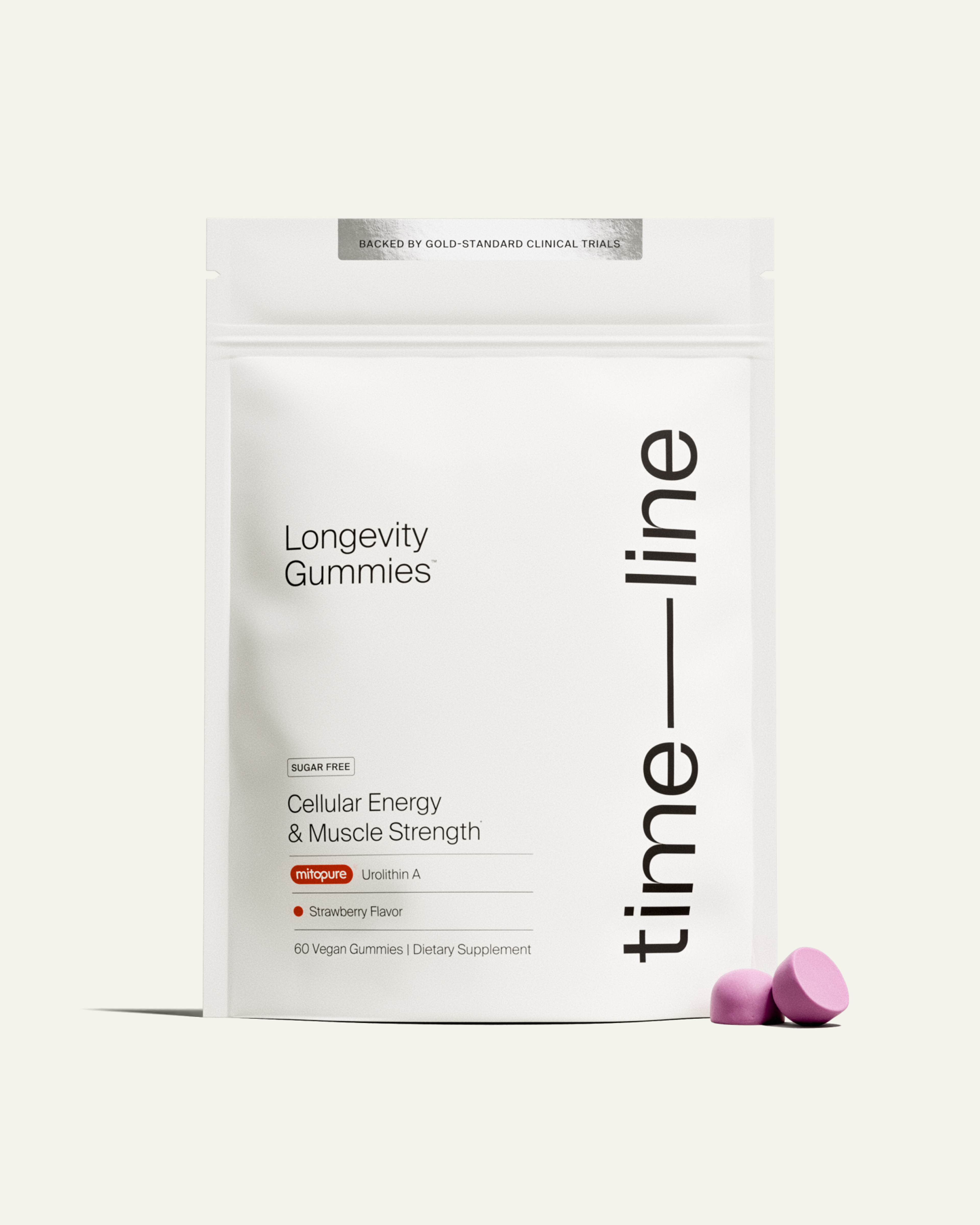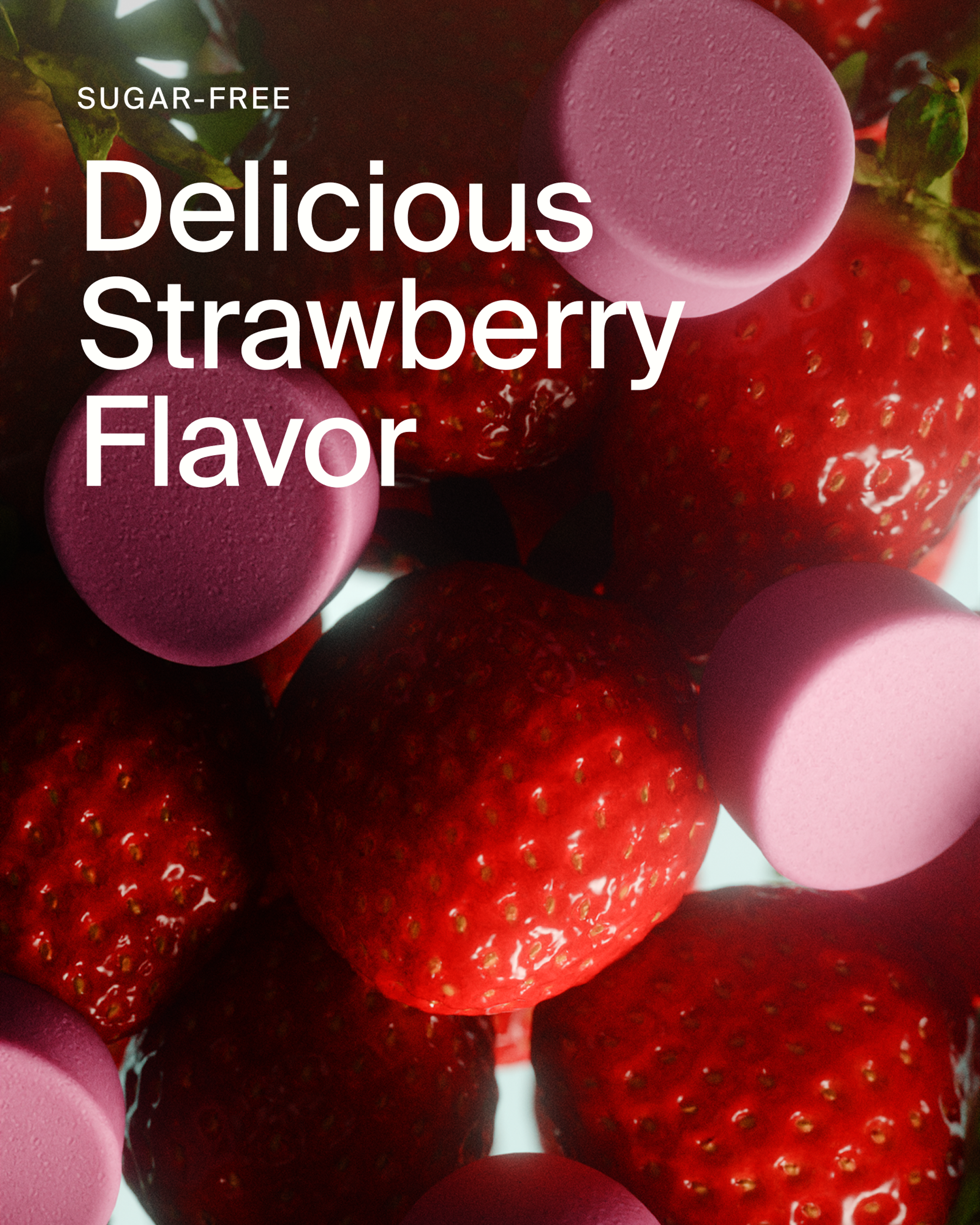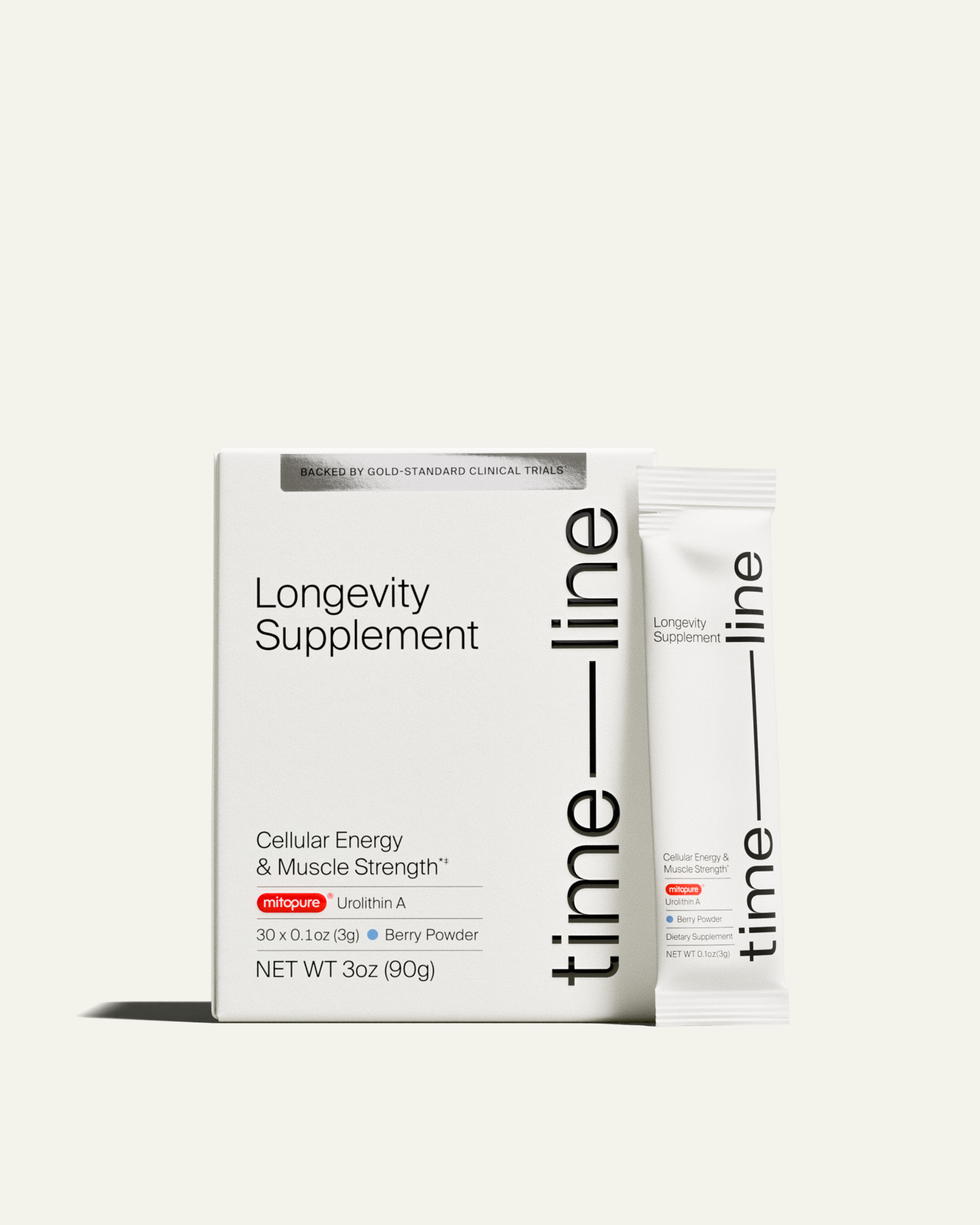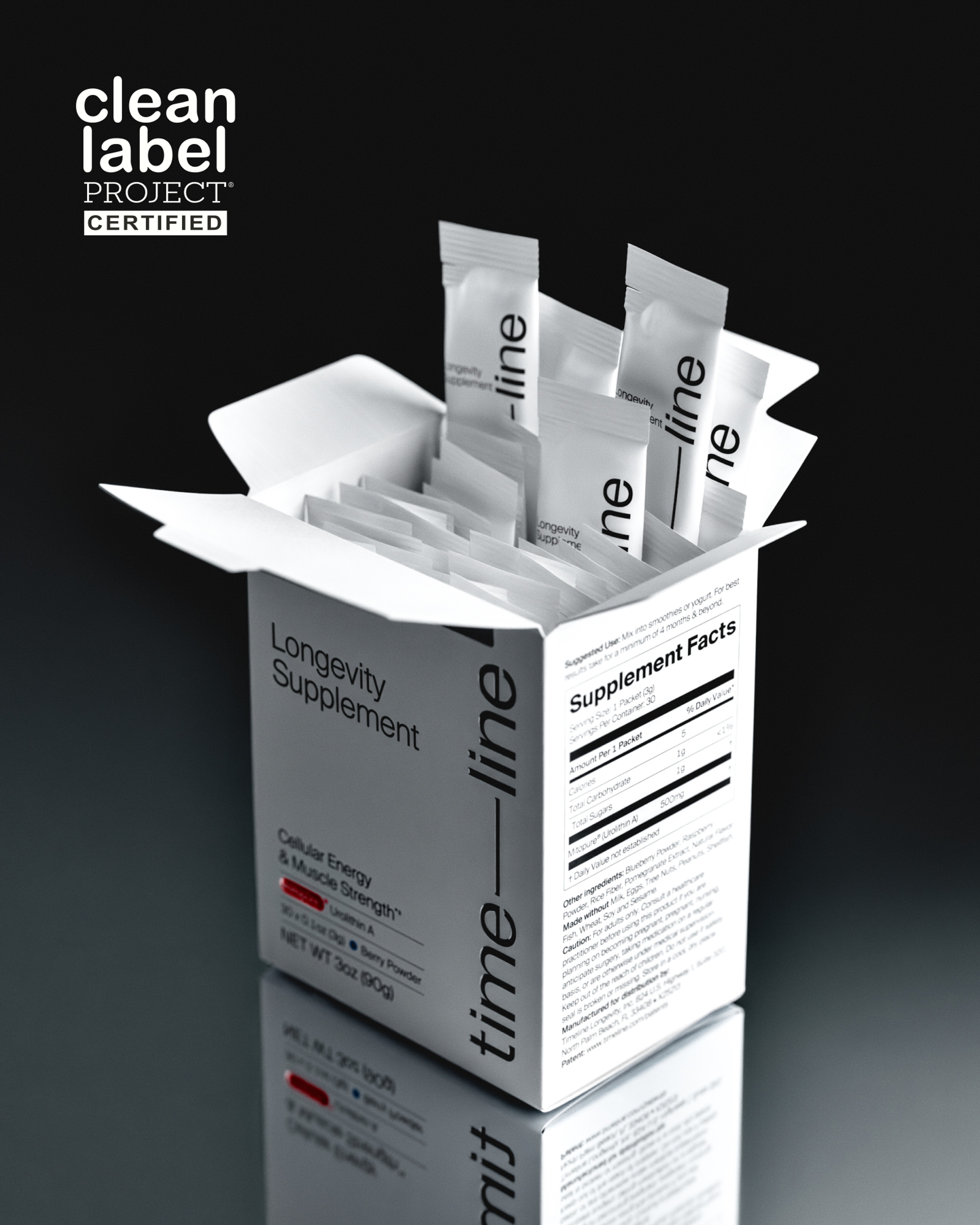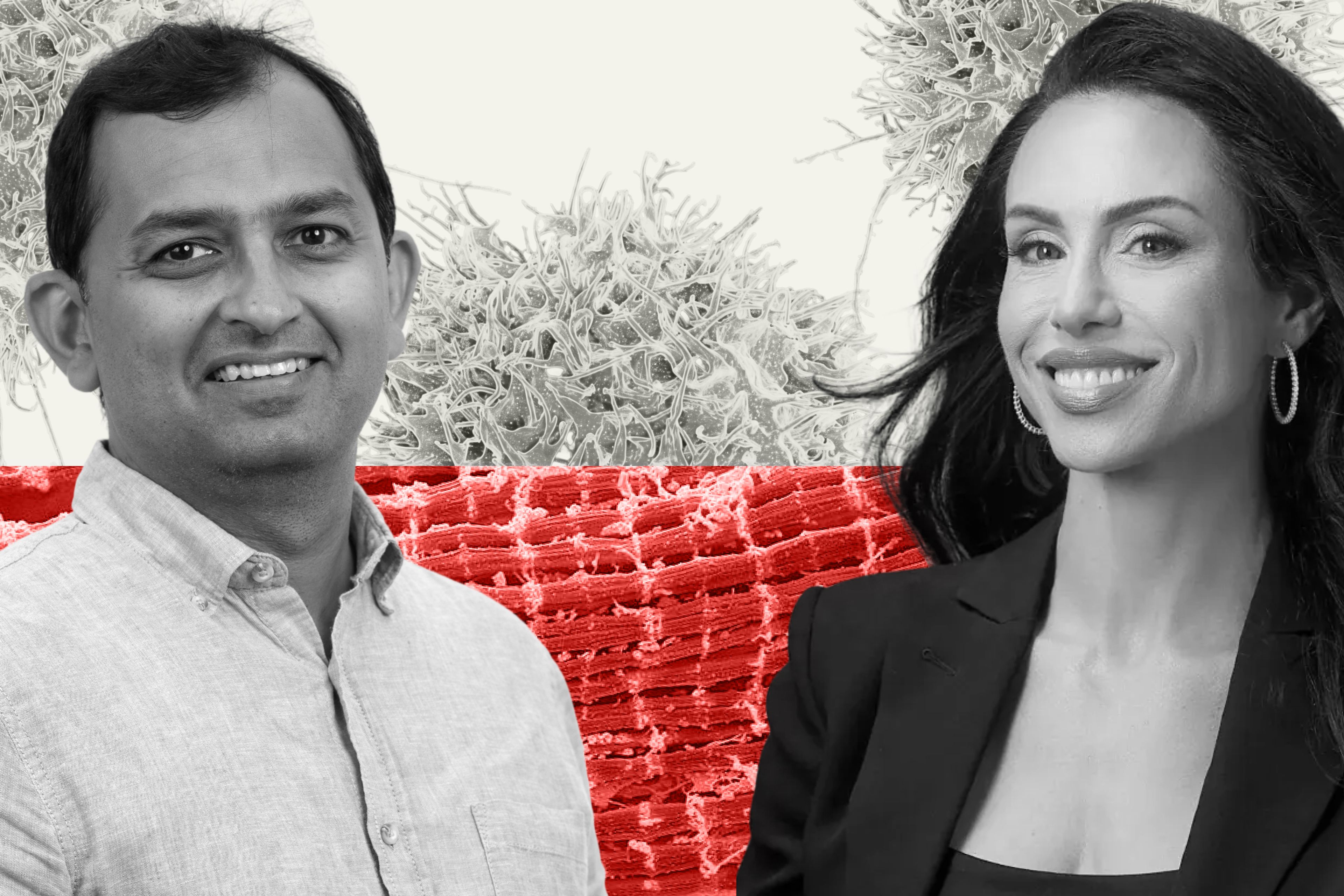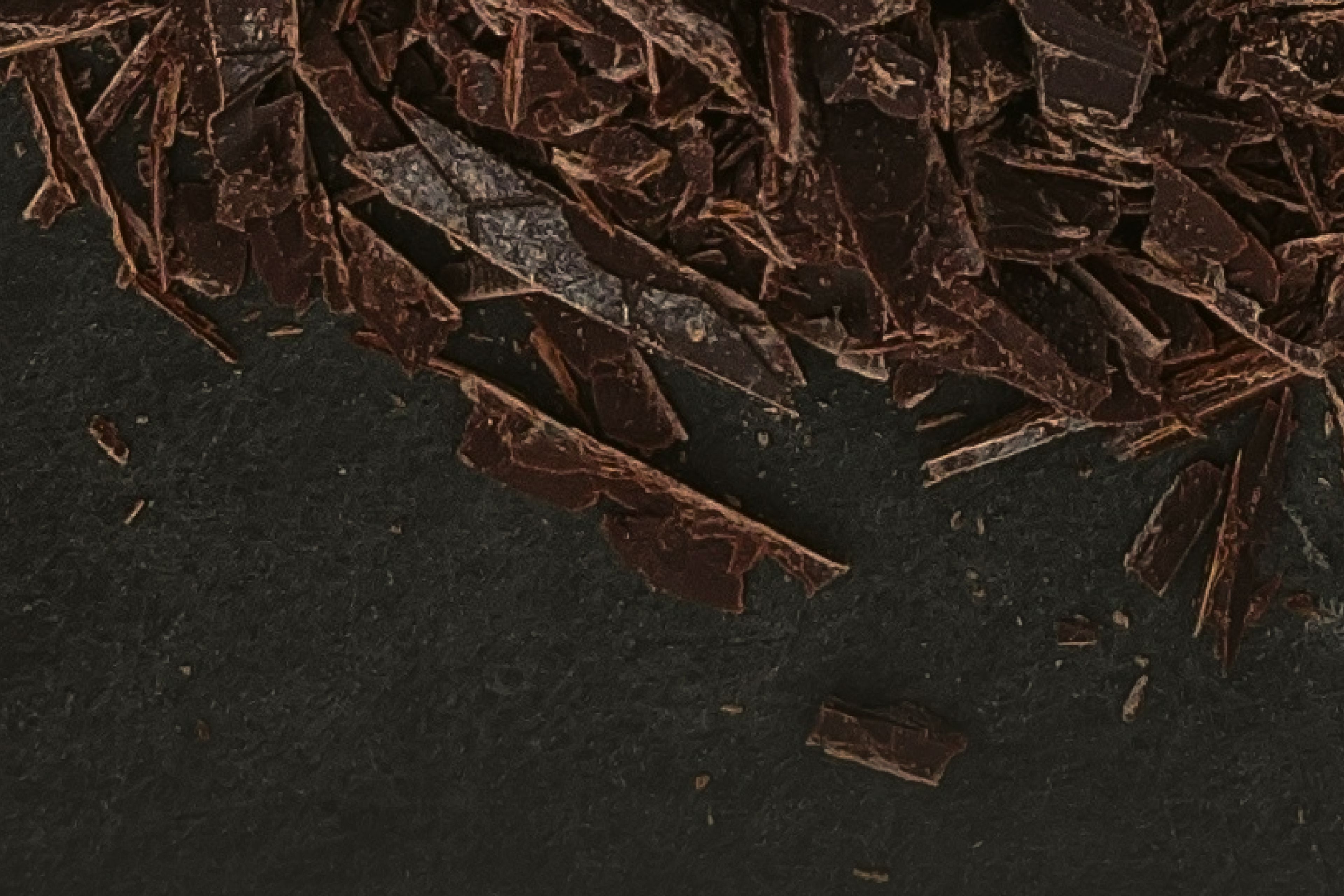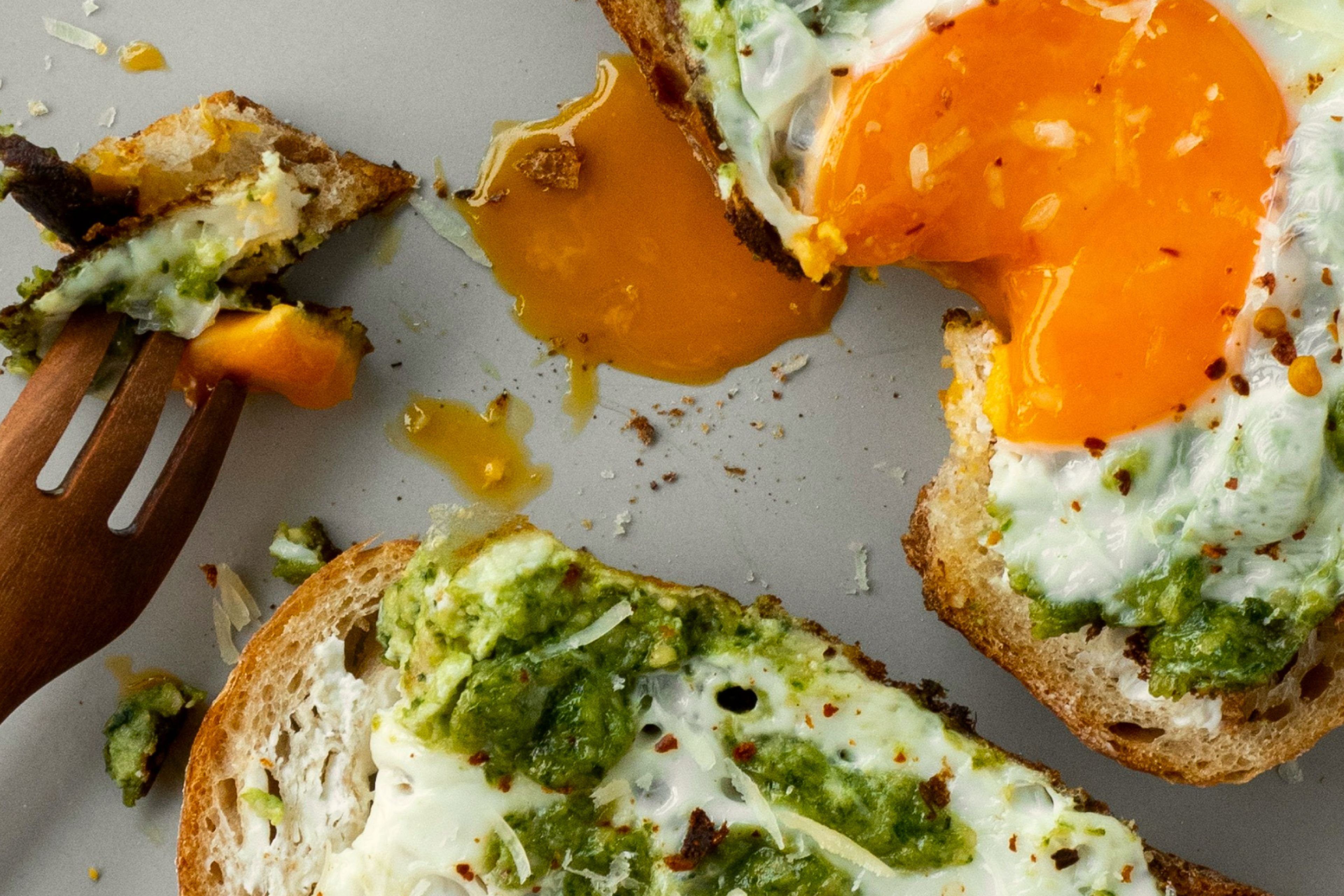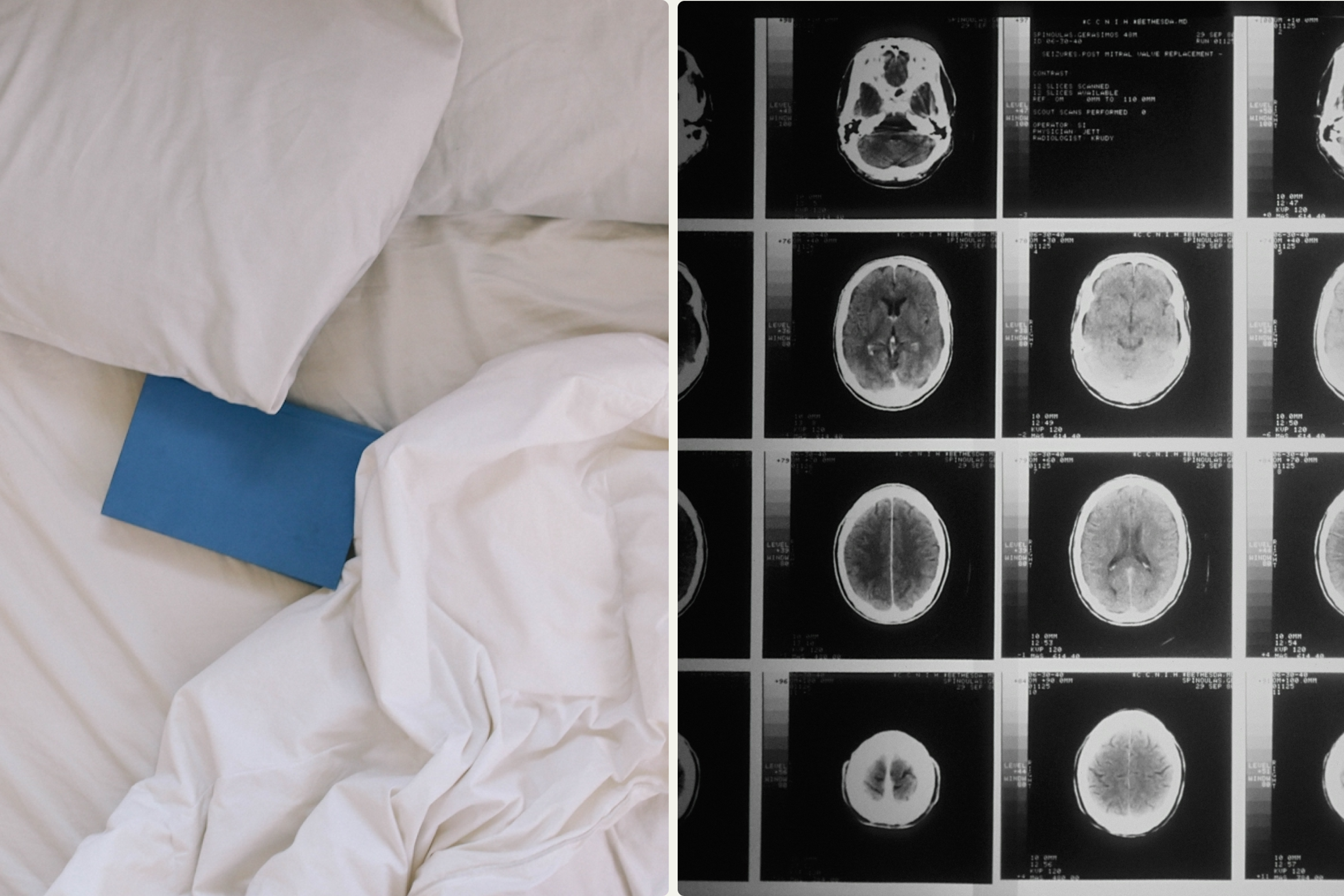Pomegranates, muscle strength and healthy aging
Dr. Anurag Singh, Chief Medical Officer with Amazentis, explains the research and evidence behind gut metabolite Urolithin A

Frailty and a decline in overall physical strength are irksome signs of aging. Regular exercise is essential to maintain optimum muscle mass and movement, but are there other interventions that could curb age-related muscle-weakening? A Swiss biotech startup is developing a supplement that could slow down the process, by replacing damaged mitochondria, the parts of cells that generate energy. It turns out that a key component could be a chemical produced by the gut microbiome when we eat pomegranates and strawberries. In this LLAMA podcast with Peter Bowes, Dr. Anurag Singh, Chief Medical Officer with Amazentis, explains the background to this developing science and its potential to help older people maintain an independent lifestyle for longer.
Topics covered
- Research at Amazentis and company mission.
- Dr. Singh’s transition from medical practice to medical research.
- The role of mitochondria – the cellular powerhouses – and link to muscle dysfunction or decline.
- Analyzing the mitochondrial health of frail vs older, active adults.
- The connection between pomegranates, strawberries, and nuts – and mitochondrial health.
- The role of Urolithin A and why it could be a valuable dietary supplement.
- Frailty is really the end – the absolute end of the aging spectrum.
- Why microbiome health is linked to muscle strength.
- Why optimal diet is not equal to optimal health.
- The role of mitophagy.
- Animal studies suggesting urolithin A supplementation promotes enhanced endurance and better mitochondrial function.
- What the first clinical studies with older, minimally active human subjects show.
- The current fascination with longevity research and desire to function better for longer.
- Functionality and the healthspan are more important than just lifespan.
Connect with Dr. Singh
Transcript
- Speaker 1
- I'm in my early 40s, and I know that muscle and cognitive function will decline in the next two decades or so. So how can I address that proactively? It's really what I'm focussed on.
- Speaker 2
- Hello again and welcome to the Live Long and Most of Ageing podcast. I'm Peter Bowes. This is where we explore the science and stories behind human longevity. Well, today we're going to delve into one very specific aspect of the science of ageing and trying to answer the question, could pomegranates or strawberries help us feel younger as we grow older? We're going to focus on a substance the body produces when we eat certain foods and ask why a Swiss Start-Up company is so excited by its potential potential to improve our mitochondrial health.
- Speaker 2
- From Switzerland, I'm pleased to be joined by Dr. Aronoff Singh, chief medical officer at Amazon Tests. Dr. Singh, welcome to the Live Long and Most Ageing podcast.
- Speaker 1
- Thank you, Peter. Thank you for having us and giving us an opportunity to talk about our work here.
- Speaker 2
- Great to talk to you. Whereabouts in Switzerland are you?
- Speaker 1
- So we are based out of the Lake Geneva area, close to Geneva in a small city close. And it's actually a hub for a lot of famous universities in the area. So we are just based out of the innovation part of the Swiss Institute of Technology here and hopefully in Lausanne.
- Speaker 2
- Excellent. And tell me a little bit more about your company.
- Speaker 1
- So the company is Amazon? Yes. It's actually a Start-Up spun out of the Swiss Institute of Technology. It's built based on the work done by a lot of famous professors here in the in the universities who have focussed a lot of their careers on understanding mitochondrial biology and and how that contributes to age related diseases. So Amazon was started about over 10 years back with the concept of basically bringing the biotech approach to the nutrition field. A lot of biotechs are mostly focussed in the pharmaceutical space, but there was a need to really bring the deep dive science approach and the biotech way into nutrition.
- Speaker 1
- And so that's what we have been doing for the last 10 years. We have been basically looking at different nutritional compounds and trying to really understand on human biology the effects and how they translate from worms to human cells to mouse cells to rodent animals, and then really starting to do some very nice human clinical trials. And you're gearing up to actually launch our products next year where we're going to delve into the science in much more detail. I'd like, first of all, just to find out a bit more about your career work, brought you to this kind of work and sparked your interest in this area of science.
- Speaker 1
- Sure. So by training, I'm an internal medicine doctor and I specialised in allergy and immunology. And this was starting in India in my medical training and then moving on to the U.S. And then I was hired by a company, Nestlé, out of Switzerland, that was kind of getting into this space between food and pharma. And they had started a subsidiary called Nestlé Health Science. And so I ran basically. And global trials are all over the world for them and mostly in my speciality, in immunology and then in ageing and the immune system with ageing declines.
- Speaker 1
- So a lot of old people who get vaccinated, they don't give very good antibody responses, immune responses. So that's how my interest in the nutrition space and the eating space started. And then from there, I moved to Amazon to five years back.
- Speaker 2
- Did you have to agonise over the decision to move from being a practising doctor, being an M.D. to moving into the research for pharmaceuticals?
- Speaker 1
- Sure, yeah. That you know, it's most doctors, the traditional career path is to really go and practise. I was lucky to have a mentor in the U.S. who was also a trained doctor. And he said, well, there's no part time research. You're in research full time if you're really committed to it. And so, yeah, I made that decision and I think it was really a good decision.
- Speaker 2
- OK, well, let's dive now into the science and the work that you're doing at the moment. And you mentioned mitochondrial health. Let's go back to the basics and explain the function of mitochondria and why they're so important. Sure.
- Speaker 1
- So mitochondria, you know, they're like the cellular powerhouses, that standard textbook definition as well, the powerhouse of the cell, when they're really these tiny pockets of energy that keep all our cells and tissues and organs going. And as we age, basically what happens is that the mitochondria do not function optimally. So with ageing, what happens is you start accumulating. A lot of faulty mitochondria and there's that basically take up space and there's so there's very little space for new mitochondria to to to be synthesised.
- Speaker 1
- That's called there's something called mitochondria biogenesis. And that leads to basically lowered ATP and energy levels. So that's the mitochondrial theory of ageing, basically, and that's what leads to muscle dysfunction or decline in muscle function. That also leads to neuronal decline or brain function decline. So you get diseases like Parkinson's disease and other diseases that are linked to mitochondrial dysfunction.
- Speaker 2
- But it is generally this is a natural cause of ageing. It's something you would expect to see in everyone.
- Speaker 1
- Yeah, yeah. But, you know, I think what what Amazon does is trying to do is basically disrupt. We see ourselves as sort of the genetic of the nutrition space where, you know, we take a deep dive into a health area and we try to deconstruct it and find some natural compounds can benefit it. Now, this is the physiological pathway. Doesn't mean you can't intervene and and delay health span so you can prolong health span. We don't want to delay lifespan necessarily, but we do believe that acting proactively in your sort of healthy ageing part 40 after you can really impact on on keeping your mitochondria optimally functioning longer and lots of you using the phrase or words health span, which I talk a lot about on this podcast, maximising the amount of time that we enjoy optimum health.
- Speaker 1
- And of course, in terms of muscle strength, as people get older, frailty is a key problem and it is sometimes the beginning of the end when people are unable to stand up, people start falling over that kind of thing. It sounds very basic, but it is very important to healthy ageing.
- Speaker 1
- Sure. No, absolutely. Frailty is really the end, absolute end of the ageing spectrum. So, you know, the typical frail, sort of wisen frail person vision that you see is someone walking with a stick or in a wheelchair struggling to cross the street. But what we want to do is really reach out to the issue even earlier, what I call as pre frailty. OK, we've we've last year we published our group, published a very nice study in Dutch.
- Speaker 1
- Old people and Dutch are known for their physical activity. So we compared Dutch old people who basically are very active and, you know, running 10 KS almost every month. And we compared them to couch potatoes, sort of elderly, very frail people who have low muscle strength. And what was really striking when we did muscle biopsies, for example, we took little chunks of muscle tissue and we looked inside after doing a battery of physical function tests. Really, this outstanding feature was mitochondrial health.
- Speaker 1
- So people who did exercise for 70 years all their life, you know, they were really had optimal mitochondrial health. But people who were not very active and they were inactive and they were sedentary, they had poor mitochondrial health. So I think that's really the key frailty you can by intervening either with exercise or with nutritional interventions or with other. Now, a lot of companies in the space of pharmaceuticals trying to intervene early to really delay this sort of what I call the frailty march.
- Speaker 1
- You know, it starts early on yet is quite striking. And I think there have been similar studies looking at, let's say, a 70 year old triathlete, someone who is still at peak fitness and showing that their mitochondrial health is akin to someone 20 or 30 or even more years younger. It's quite striking when you see that kind of absolutely data. So I mentioned pomegranates and strawberries in the introduction. What is the relevance to these kinds of foods?
- Speaker 1
- These from the natural compound that our company is leading has led the discovery and now the sort of building towards commercialisation. It's a natural gut metabolite that is called as your litany. It's produced by the gut microbiome and it's only produced when you eat pomegranates and strawberries or walnuts, all the good things that you know that are that are tied to good health. Now, these fruits and nuts that they contain the precursors Cullis Eligio tannins. OK, so these are polyphenol compounds that are very abundant in pomegranates and they're also found in abundance in strawberries and raspberries and walnuts and pecans.
- Speaker 1
- And so when you take, for example, you drink a glass of pomegranate juice or you eat a bowl of strawberries or nuts, you're getting these precursors in. The key thing is you need to have the right gut microbiome that will then harness these compounds and, you know, enable the release of your liver. And so it will basically from these precursors. Rate at this compound earlier today. So that's the link to pomegranates and strawberries, so presumably we will have different good volumes.
- Speaker 1
- Are we therefore to differing degrees able to do this conversion, essentially reap the beneficial rewards of eating fruits and nuts of the kind that you describe?
- Speaker 1
- Yeah, so I use a term always that optimal diet is not equal to optimal health. And I think the key factor that decides whether optimal diet is equal to optimal health is really our gut microbiome, how it harnesses all the key nutrients from our diet. And we've looked into it and I think a couple of academic groups have looked into it as well. There's a tremendous heterogeneity in the gut microbiome of the human population. And what we see is about one third of the human population.
- Speaker 1
- If they're exposed to the right diet, if they're eating, of course, a bowl of nuts every day, they will produce varying amounts of Yooralla. Tonight, we don't find it in about two thirds of the population. So there is tremendous variability to do this conversion that's related to the gut microbiome profile of a certain person. And and that's yeah, that's pretty interesting from a sort of scientific question. What is the right gut microbiome? I mean, this is a question we are tackling right now as well.
- Speaker 2
- So just explain to me in a little more detail in a exactly what does it do? It is a much tougher activator, as I understand it. Could you explain the process of my Tofurky and why that's important to us? Sure.
- Speaker 1
- So my Tofig is really the biological process of cleaning up or let's say the garbage disposal of of the faulty mitochondria in our in our cells and tissues. So think of your you know, the waste garbage disposal system in your in your house or in your you know, if it keeps accumulating over time and there's less and less space to put more garbage and after a while it will start smelling so similar. Our human bodies are, you know, have have this process in built into them called my Tofig, that basically with ageing is not very optimal.
- Speaker 1
- So what you what happens is these faulty mitochondria are basically accumulating in in the cells. And what that leads to is for ATP production, a competition of space for newer mitochondria to grow. So there are a lot of that today. You can improve mitochondrial function in a few ways so you can either have compounds, natural compounds or other kind of compounds that induce what is called Biogenesis. So you can allow your mitochondria to grow or you can make them work optimally.
- Speaker 1
- Now, you're today is very unique that it's one of the first known my Tofig activators, which means it's by cleaning the poor faulty mitochondria out. It's giving space for newer mitochondria to grow. So that's in essence, is my daughter Fidge.
- Speaker 2
- We've talked quite a lot on this podcast about autophagy, which is another similar sheerness that presumably works alongside MIT or Fuji, essentially getting rid of cells in the body that have passed the best and need to be replaced.
- Speaker 1
- Yeah, yeah. So Midford is really autophagy of the mitochondria, very specific to the mitochondria. Autophagy has been known to be triggered by a number of things, caloric restriction, even exercise, aerobic exercise. And and I think. Yeah. So it's our compound has a very specific effect on mitochondria. And that's by removing these faulty mitochondria with a Tofig or specific to mitochondria, to physical activity. That's how it does the job.
- Speaker 2
- So having established that euro within A is positive in terms of the multiple processes that need to happen within our bodies to reach optimum health, especially as we're growing older, what do the animal studies that you've been conducting, what do they show us?
- Speaker 1
- Sure. So this is a very nice paper we published about three years back in 2006 in a very high impact journal, Nature Medicine. And this is work done by Amazon is in collaboration with some of the key labs in the Swiss Institute of Technology, including the lab of Professor Johan Albrecht's. And what they showed really was indifferent, let's say ageing models or, you know, all the animals given 22 month old animals. This is equivalent to a 75, 80 year old human being.
- Speaker 1
- They were fed just for six weeks. You're Latinate orally in the diet. They started showing about 40 percent higher endurance. So they were running faster and longer. And when you looked at the muscles of these these old mice, they had better mitochondrial function. And now what was also done was sort of middle age spectrum was also investigated and. Mice that were given a high fat diet, for example, that is known, you know, synonymous with a 50 year old overweight human being person and earlier was given from, let's say, six months to 24 months, which is about an eight month intervention.
- Speaker 1
- These mice were running faster, too, and they had better muscle strength. So this was really the key discovery. And what is key to remember about these this work in this paper is that Johan and his team, Professor IREX and his team and the team of Misandrist at that time, they went from worms. Traditionally, worms are very used model in ageing research. So they went from worms to cells to animals and now even humans. So the mechanism seems to be very focussed on mitochondrial rejuvenation, which is another word I use for my Tofig.
- Speaker 2
- So going from worms to rodents to human beings, can we realistically expect to see the same kind of impact, the same kind of effect in a person?
- Speaker 1
- No, we are very optimistic about this because we have just published our first clinical studies on your earlier today and what we showed in these studies. These were studies done in elderly folks who are not very active. So we gave them different increasing doses of erlotinib and it was extremely safe. We did a whole battery of safety tests, you know, looking at ECG and blood pressure and all the vital signs and also looking at different blood biochemistry profiles. And really, it was it's a natural compound.
- Speaker 1
- So it had a very safe profile. And then we looked at different durations of treatment. So we did one day and then we we did a four week long oral supplementation with the earlier today. And what we found was that, um, as I told you, about one third of the population came in with lower or almost no, they had some alternate levels in the rest of them had no utility levels. And when we gave them all your earlier today, this was a double blinded placebo trials.
- Speaker 1
- So the placebo subjects, of course, didn't show any increase in erlotinib, but in the healthy, the elderly that received your Latinate supplementation, we saw very nice maintenance, uh, levels of Yooralla today. And then we did muscle biopsies. So this is a way you can really go deep into looking at how the mitochondrial health is in the skeletal muscle. So we did biopsies before people, elderly people started the oral supplementation with erlotinib and then we did muscle biopsies after the supplementation ended.
- Speaker 1
- And then we compared the gene profile of the biopsies before and after. And what was really striking, and that's why the paper that we published got into one of the leading metabolism journals, Nature of Metabolism. What was really striking was that the mitochondrial gene signature was really up regulated in a significant way. And when we compared it to the Dutch study I was telling you about, we compared it to the profile in the muscle of either an active individual or a pretty frail individual who's the same age.
- Speaker 1
- We saw that exercise was improving. The mitochondrial health in, you know, our compound was improving mitochondrial signature in a similar way.
- Speaker 2
- Just to explain one little bit of scientific terminology that you used to saw, a double blind study is when the person carrying out the study and the person being studied, the investigator, the lead investigator, doesn't get no one knows whether using a blank or you got it. Yeah. So the the way you do it is you basically design. So we gave in this study, we gave them in soft gel capsules and and the placebo looks identical. It's just that it doesn't have your relatedness of the subjects when they are taking it.
- Speaker 2
- They don't know what intervention they're taking. And the investigator who's giving it to them doesn't know what what they have.
- Speaker 2
- And is it possible to say you're dealing with a 70 year old? At what age could you perhaps correlate the level of your life in a way that they have now with this supplementation compared with what they might have had when they were much younger? Does it perhaps take them back to a typical 30 year old or 40 year?
- Speaker 1
- Yeah, that's a tough one. So what we do know is that the gut microbiome changes with with age. OK, so we do know that and we compared the the genomic signature in the muscle in this study that we published with with the non interventional group. So we compared it to people who had done exercise all their life. So the 70 year olds who had done exercise all their life, we compared it to that. So yeah, people who exercise all their life at 70 as you.
- Speaker 1
- Mentioned yourself there, their mitochondrial health is pretty much like a younger person, so, yeah, you're a Latinate does impart health benefits and mitochondria that are similar to to, you know, that probably stop the ageing of the mitochondria. And I'm not saying it's going to reverse it and make you look like a 30 year old, but, yes, it does have an impact and improves the mitochondrial health and clinical changes aside data. Aside more from an anecdotal how do you feel kind of perspective?
- Speaker 1
- What did this group of older people say about their strength, about the vitality, about their endurance?
- Speaker 1
- You know, we have taken a very step by step approach. So as I mentioned, we first wanted to be sure this was completely safe, which it is then we wanted to make sure that it was bioavailable and could boost the levels of whatever from the dietary exposure of Gurlitt. And then we wanted to give it for four weeks to look at what are the doses of your litany that will have an impact on humans. And now what we are doing actually is we are running much longer studies in the U.S. and Canada where we are giving your DNA for four months and we are making people go on to our gorm and they do what is called as an exercise test, where we are looking at their, you know, capacity to produce energy and how optimal it is.
- Speaker 1
- And then we are making them do a different kind of physical functional test, like a walk test, for example. And so what we are really trying to assess is the effects on physical function. So these studies are ongoing and they're due to finish at the end of next year. But I've already had a few subjects asking. Well, I'm feeling from anecdotal. You asked some of the old folks there, you know, saying, oh, four months we've finished your product, how can we buy it?
- Speaker 1
- So that's the thing. You know, they feel even though it is a double blind placebo trials, we don't know yet because we haven't finished these longer term studies yet. So, yeah, we are waiting on these results and we will be happy to share them.
- Speaker 2
- Just moving away from your research, I'm curious to know in more general terms your thoughts about the science of human longevity and why there has been such a boom in recent years with Start-Up companies pursuing this kind of research.
- Speaker 1
- So I think one of the reasons why there's been such a growing interest as of late and in the science and research on human longevity is because, for one, humans have been the lifespan. If you compared that to fifteen hundred years back, the human lifespan, it's almost doubled from 40 years to about 80 years and average now. And and so what that means is that the underlying question has been on the health span and the functionality as we are living longer.
- Speaker 1
- And so a lot of Start-Up companies are looking actively at the different hallmarks of ageing and the biological pathways, whether that is linked to mitochondrial health or telomere biology or senescent cells with active research going around analytics. So I think that that's really the core behind the increase in human lifespan and the desire to be functionally better with this increase in human lifespan.
- Speaker 2
- And a question I often ask, do you live your life in a way that's focussed on longevity, your daily regime, your exercise, your diet?
- Speaker 1
- I don't really do anything on the extreme regarding dietary choices. I do eat a lot of fruits and nuts, as we've already discussed, that there are certain vital nutrients in these in the dietary choices you make that, you know, given the right microbiome that you have, can can release the beneficial nutrients. So I do either diet, region fibre and I do take probiotics and yeah, a lot of fruits and nuts. I don't really buy into the craze on all the ketogenic and the calorie restriction diets yet because I would wait to see more scientific and clinical evidence on those regarding exercise.
- Speaker 1
- Yes, I am. I do run twenty to thirty minutes every day. Mostly I'm a weekend warrior. Sometimes I skip and enhancement, you know, and that's one of the reasons. But when you think about a person in their 40s and 50s with their busy lifestyles, you always struggling for time to to basically do physical activities. You want to do it, but you're struggling for time. And so there are times in the in a week where you are doing exercise, you are running outside or inside on a treadmill.
- Speaker 1
- But you want to keep that physical health, you want to maintain it. And that's where dietary supplementation with with. A national campaign suggests what we are working on, your letter may come into play because our hope is that they can bridge this sort of maintenance gap that you can get from regular exercise.
- Speaker 2
- We've mentioned health SP1 vs. lifespan. Do you focus yourself on reaching a great age? Is it important to you?
- Speaker 1
- I don't necessarily focus on reaching a great age, but yes, one of my focuses in is is on being functionally better as I age. So to address actively, proactively the decline that, you know, I'm in my early forties and and and I know that muscle and cognitive function will decline in the next two decades or so. So how can I address that proactively is it's really what I'm focussed on and be functional when I'm 75, 80 years old and be able to enjoy the outdoors.
- Speaker 1
- So, yeah, I think the functionality and the health span is more important than just lifespan, you know, living to the hundred and and not being able to be functional and, you know, move around and do your daily job is not what I think from my personal perspective that I'm interested in. But yes, being an 80, I can imagine myself being an 80 year old and being able to go around to the supermarket and do my groceries.
- Speaker 1
- I think that kind of functionality retention is what I would like to have.
- Speaker 2
- Well, finally, and thank you very much for discussing your research. Is there a way that our listeners can get more information or dig a little deeper?
- Speaker 1
- Well, thank you, Peter, for having me on your on your show. I think listeners can know more about the science behind your earlier today and what we are doing actively and mitochondrial health in general at Amazon as they can go into a website about your wallet and a dot com, or they can visit the company website Amazon.com to learn more. I think just I would leave the last take to the listeners is that we are very, you know, scientifically driven company and we take great pride in looking and researching new natural compounds.
- Speaker 1
- Erlotinib is really a unique compound because evolutionary it has always been originating from our diets. I mean, our ancestors ate a very healthy plant based diet. And so evolutionary as we have, you know, gone down that path, we have some of us have lost the right microbiome to to harness the true potential of of uh and of course, we are not all eating an optimal diet. So dietary supplementation with the earlier today can really short circuit and the imbalance derived from the gut microbiome and diet and and allow everyone to, you know, functional function at their maximum potential with better energy and better mitochondria and cellular have.
- Speaker 2
- Doctor and Roxanne, thank you very much.
- Speaker 1
- Thank you again, Peter.
- Speaker 2
- Pleasure. I'm certainly going to follow your research with interest and also include in the show notes for this episode, some links where if anyone wants to take a closer look at the subject, they can go to get some more information. You can check out our website at Lahmar podcasts dot com, that's amay podcast, dot com, live long and mosta ageing. You can also read review is at the podcasting platform of your choice. It's always really good to hear your thoughts on the interviews that we do.
- Speaker 2
- However, many thanks for listening.
